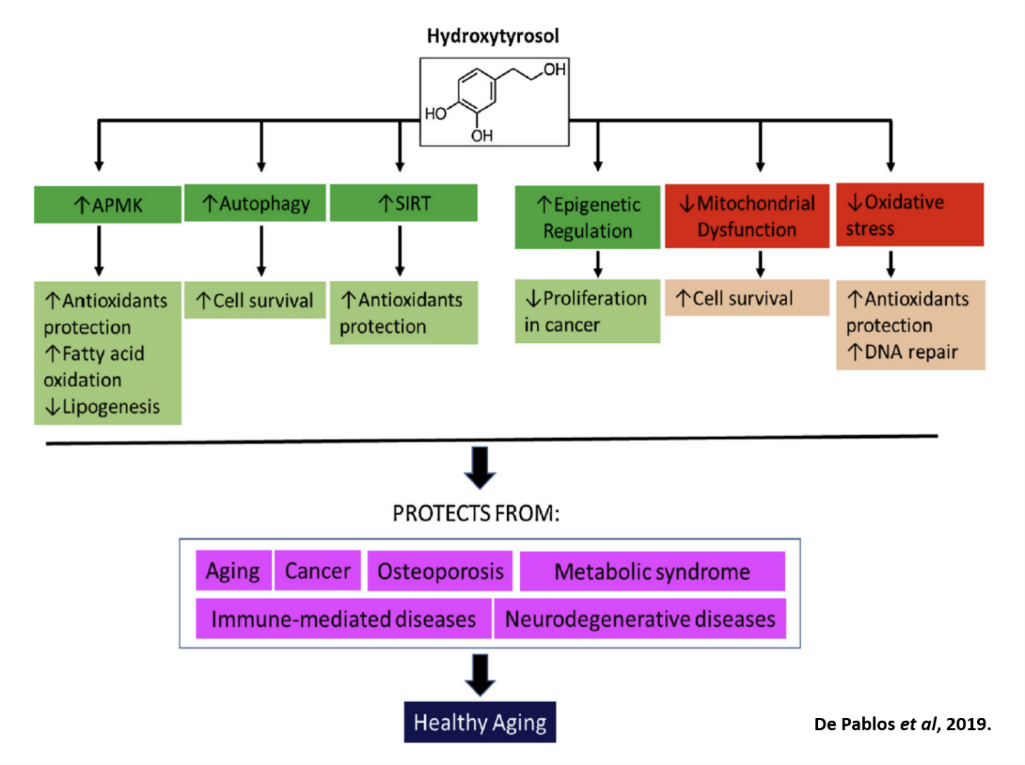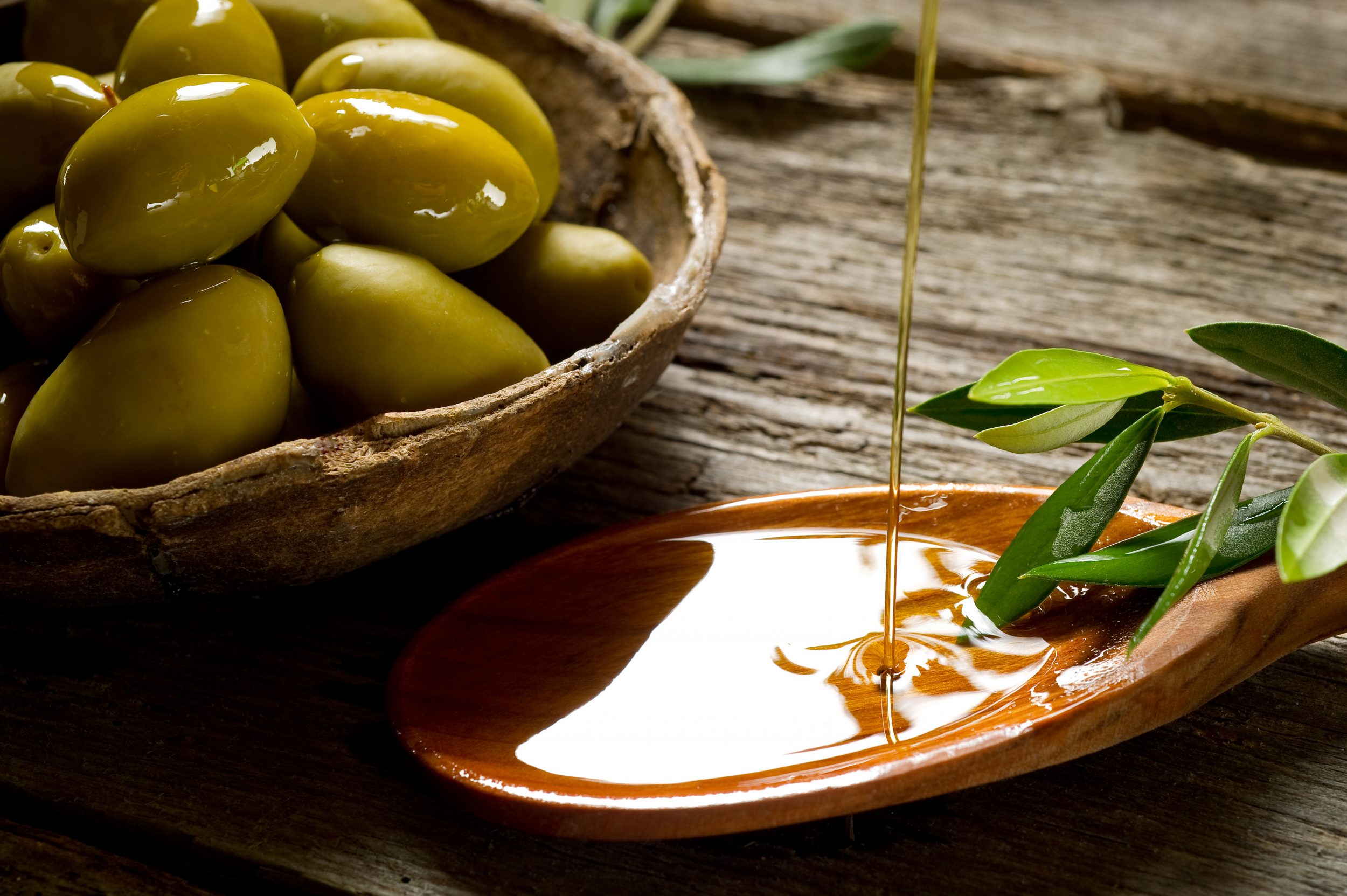From the scientific article: de Pablos et al., 2019.
I recently spoke about a scientific publication in the prestigious New England Journal of Medicine which says that fasting slows aging. I talked this subject during the 1st and 4th video, which you can now watch on the Vitoli Youtube channel (French only).
It made me think of presenting other scientific articles on healthy aging. So today I’m going to tell you about an article published by researchers from two European universities, one in Spain and the other in France. The article from de Pablos et al., 2019: Hydroxytyrosol protects against aging via AMPK and autophagy; a review of the effects on:
- cancer,
- cardiovascular illnesses,
- osteoporosis,
- immune diseases and
- nervous degeneration.
Based on 194 scientific references, the researchers in this study described the antiaging effects of hydroxytyrosol (the most important olive polyphenol) for a large number of diseases associated with aging. It is also hydroxytyrosol that we use as the main standard for the Provitol Complex of the Vitoli products.
Polyphenols in olives vs. oil
Olive oil is the main source of fat in the Mediterranean diet. They consume 25 to 50 ml of it per day. A quick reminder: the Mediterranean diet is associated with a 50% reduction in mortality rates, from all types of mortality combined, and with a significantly higher longevity.
The most interesting thing about olive oil is that studies have clearly shown an increase in the majority of health benefits, in a directly proportional way, with the amount of polyphenols in the oil. In other words, for the same amount of oil, when the amount of polyphenol increases, the following benefits increase:
- The increase in good cholesterol;
- Improvement of the triglyceride/good cholesterol ratio;
- Reduction of markers of inflammation;
- The oxidation of bad cholesterol;
- Reduction of markers of oxidative stress.
Other studies have later shown beneficial effects of oil-free polyphenols on a wide variety of health benefits, such as osteoporosis. I will come back to this later.
To finish with the polyphenols found in olive oil, know that for those who consume olive oil, extra virgin oils are of course to be preferred. Choose the darker ones, with a more pronounced acrid taste. Polyphenols are responsible for the dark color and the pungent taste (characteristic of olive oil). That is to say, light-tasting clear oils have practically no polyphenols. The concentrations vary a lot from one oil to another because the polyphenols are soluble in water and not in oil. Therefore, they tend to stay in the olive pressing rather than remaining within the oil.
Hydroxytyrosol protects against aging
Hydroxytyrosol is the most important polyphenol in quantity and in terms of health benefits. It is only very recently that scientific research has made it possible to understand that these multiple benefits are linked to the processes of aging. What the article by de Pablos et al., reported was that this polyphenol protects against aging via AMPK and autophagy. I will come back to these two mechanisms, but before I do, I will make a short parenthesis on the mechanisms of primary aging.
In the field of the science of aging, we now define two types of aging: primary aging and secondary aging. Primary aging is the urge of the body to age. There are mechanisms in our cells that cause the body to age and this causes problems in cellular functioning. These operational problems in turn reduce our repair capabilities. The accumulation of damage and the difficulties of cellular functioning will cause the diseases related to aging. This is called primary aging. Secondary aging, for its part, is linked to our lifestyle, good and bad. For example, smoking accelerates aging.
For primary aging, we can group the mechanisms under 6 main processes:
- Inflammation;
- Repair processes;
- The production of antioxidants;
- Cell survival;
- Recycling;
- The production of proteins.
What was reported by de Pablos‘ article was that hydroxytyrosol protects against aging by acting on all the processes of primary aging. It is the only modulator known today to have such a comprehensive impact on the mechanisms of aging. A group of Spanish researchers had categorized olive polyphenols in 2013 as “gerosuppressive agents”; suppressants of aging. Therefore, hydroxytyrosol has a lot of health benefits that are linked to the basic mechanisms of aging.

In the second article to this series, I will continue my explanation of this important scientific publication by telling you why hydroxytyrosol could increase healthy life expectancies.
References:
- Cicerale et al, 2010. Biological Activities of Phenolic Compounds Present in Virgin Olive Oil. Int J Mol Sci. 2010; 11(2): 458–479.
- de Pablos et al, 2019. Hydroxytyrosol protects from aging process via AMPK and autophagy; a review of its effects on cancer, metabolic syndrome, osteoporosis, immunemediated and neurodegenerative diseases. Pharmacological Research 143 (2019) 58–72.
- Eric Simard, Dr en biologie. 2016. Vivre jeune plus longtemps; Chapitre 3.2, Les polyphénols d’olives et la diète méditerranéenne. Marcel Broquet la Nouvelle édition. 364 pages.
- Menendez et al, 2013. Xenohormetic and anti-aging activity of secoiridoid polyphenols present in extra virgin olive oil. A new family of gerosuppressant agents. Cell Cycle 12:4, 555–578; February 15, 2013.
- Peyrol et al, 2017. Hydroxytyrosol in the Prevention of the Metabolic Syndrome and Related Disorders. Review. Nutrients 2017, 9, 306.
- Visioli et al, 2002. Antioxidant and other biological activities of phenols from olives and olive oil. Med Res Rev. Jan;22(1):65-75. Review.
- Barzilai, et al, 2012. The rationale for delaying aging and the prevention of age-related diseases. Rambam Maimonides Med J. 2012 Oct 31;3(4)






